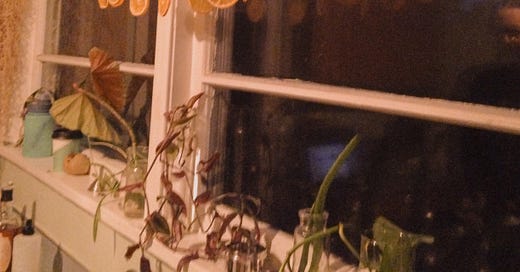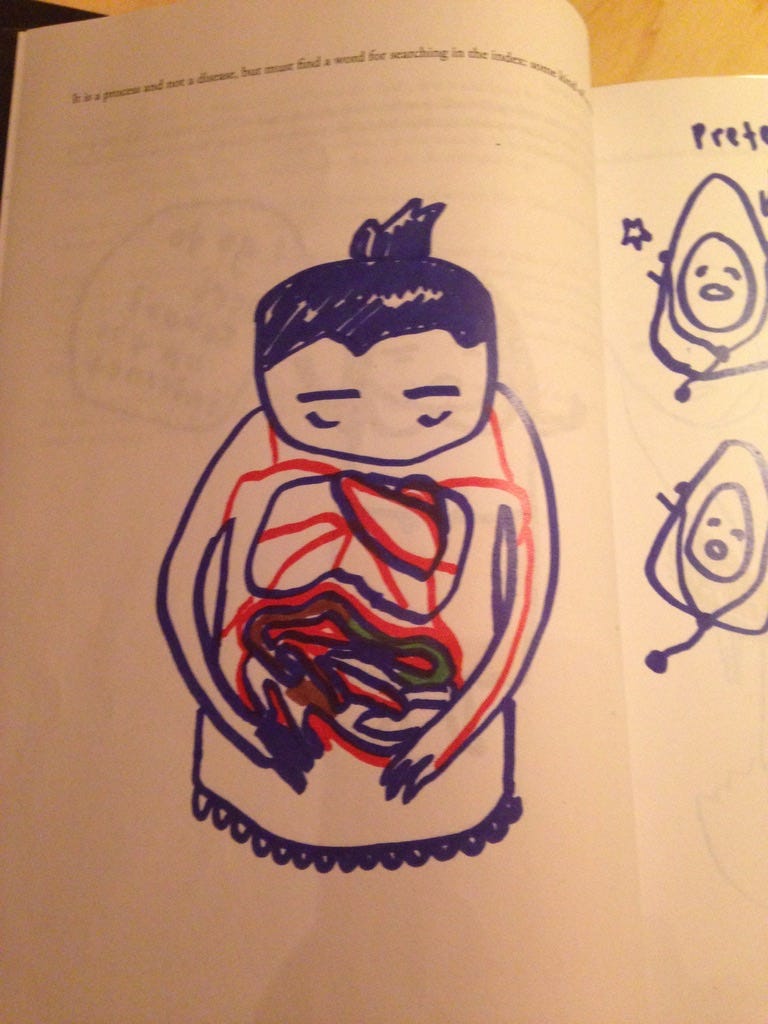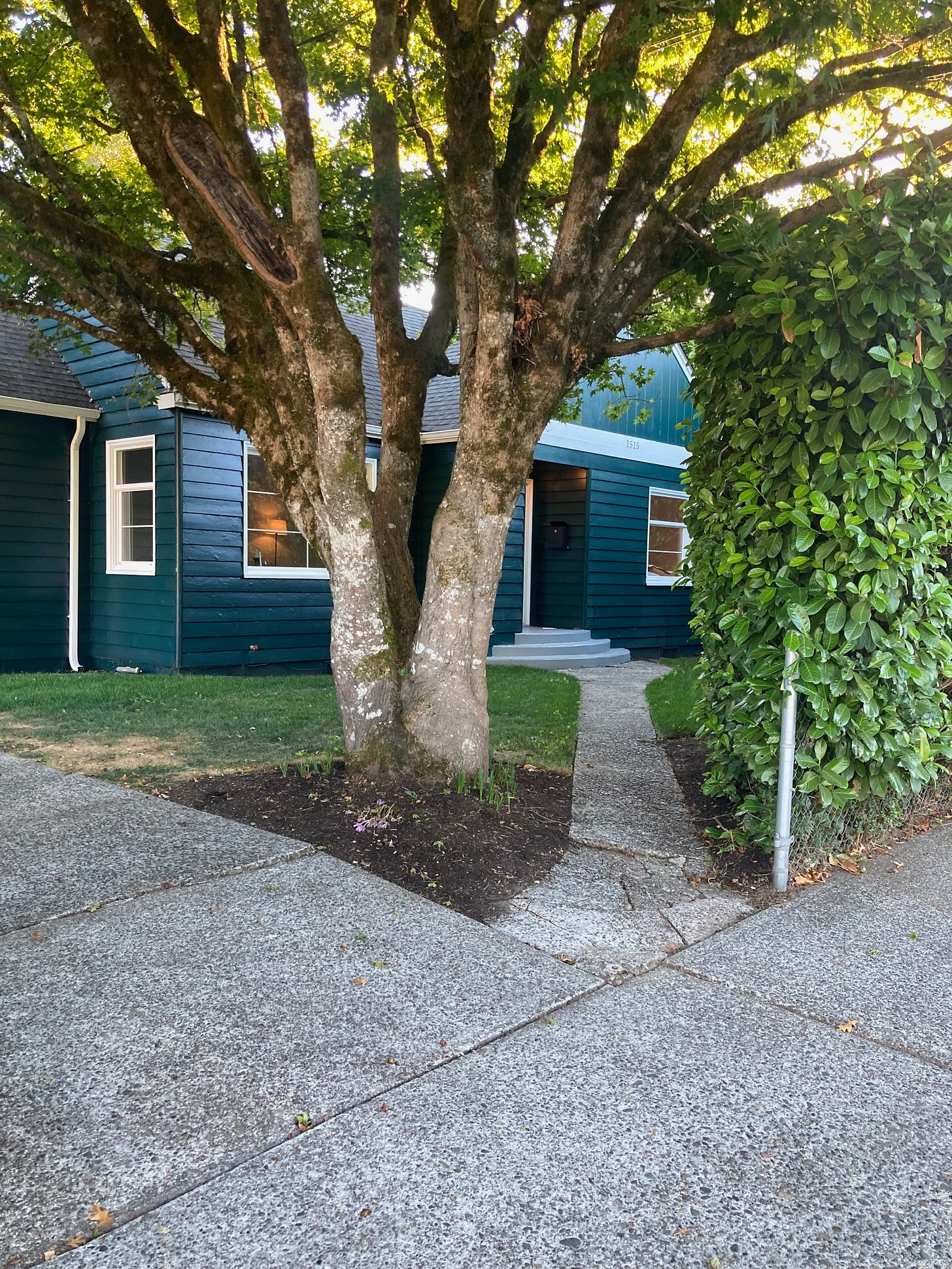For the past few weeks, memories of the fall of 2016 have hovered around my thoughts like ghosts. Today, those memories have entered the room as a visible presence—a recapitulation of where I was in life eight years ago along with dread about the future. Back then, I was living on the West Side of Olympia in a house called Crusty Blue. Its ultramarine exterior was faded with age and weather, but inside our housemates cultivated an impeccable dollhouse. Their mid-century furniture was artfully arranged with tidy sheepskin rugs, a sophisticated palette of dark wood and emerald houseplants. Crusty Blue was just three blocks away from the angular, Pacific Northwest rambler where my partner Ethan and I had spent the past few years, but it had cheaper rent. So that summer, we scrubbed the walls and filled in the garden beds I’d come to know, erasing as much evidence of our existence as possible. I ran a sponge across the blank beige walls, wringing it out into a pail of soapy water that turned murky brown with dissolved particulate from our time there. Washing away the parts of me I’d never get back felt optimistic, though it was difficult for me to stay awake for the disassembly. I drank black coffee, flagging in the August afternoon.
Our room was in a converted garage in Crusty Blue’s backyard. When the autumn chill blew in and the rain started, dampness seeped in at the concrete edges of that structure (which was branded as a “bungalow”). Branches of a gnarled apple tree tapped the window by our bed and its fallen fruit wafted yeasty rotting sweetness. I got sick frequently that winter with influenza and other fevers. I interpreted them as internalized responses to the political strife that was also unfurling, like I couldn’t erect enough of a barrier between myself and all kinds of decay.
Even without the election, it would’ve been a ragged period of my life, and my poor physical health was already underway before the raw shock of its outcome. I was exhausted and anxious, and these twin sensations fed a vicious cycle of doubt in my future. But unspoken root of my despair was my brother’s homelessness, which, along with the psychosis that had gradually led to that state, had settled into a chronic condition by November 2016. The specter of that gaunt lost lamb wandering the streets and sleeping on the light rail was a spreading shadow in my life, both an extension of the broader situation and a private, wordless panic that bit me throughout each day.
This pain was aggravated by a sense that I was failing to articulate (in writing) how this grief rhymed with the ambient catastrophe. Life kept presenting me with images that echoed each other, or clashed so terribly that it seemed to mean something. For example, side-by-side with Crusty Blue—its front yard filled with neat rows of sunflowers and dahlias—our neighbors’ house was a pockmark, spewing pizza boxes onto the sidewalk from its shady, rhododendron-cloaked driveway. In the backside of the house, a window was stuffed open with clothes. There were a bunch of clothes by the back door too, either a trash pile or laundry drying in the worst way. A giant stuffed bear, the kind that exclusively exists as a carnival prize, lay on its soggy side in the grass, grinning cheerfully. It turned out that Diggy, the most enigmatic regular at the coffeeshop where I worked, lived in that house. He wordlessly ordered the same thing every day—just stand in the doorway and hold one hand up, stiffly signalling a request for an eight ounce latte. He’d go pace the neighborhood with hands in the pockets of his trenchcoat, and eventually return for his drink (which had often grown cool and puffy) with hands that shook with delirium tremens, social anxiety, or some kind of internal blusteriness. He always tipped a dollar and gave a nervous, gravely thanks.
I knew, thanks to a conversation I’d overheard through an open window on a warm fall day, that Diggy was into Trump. Somehow that information magnified the tenderness I felt towards him, further evidence of vulnerability hidden under his surface. We never made eye contact, but it wasn’t unusual for me to cross paths with him when I, too, paced the neighborhood. Was I more like my hipster housemates or more like Diggy? It felt like living in a storybook whose spell I was trying to break by putting it into words, making myself an author rather than just another character filled with unreasonable hope.
Most of the dread I’ve felt leading up to this election has been about its political implications. But lapping through another arduous Trump campaign has also brought the personal loneliness of that era eight years ago to the surface of my memory. I’m grateful for all the things that have changed in the past eight years, including for my brother. He has long-term shelter and I have my own house. But on a subconscious level, I’m afraid of falling back into that kind of despair. I want to assert distance between my time at Crusty Blue and my present, but revisiting it feels unavoidable, like the questions I was trying to decipher and the precarity I felt are still wanting interpretation—especially given the outcome of yesterday’s election.
That outcome is less shocking this time around, but feels more like betrayal. There’s so much to say about populism, false promise, authoritarianism, failure of imagination, deciphering affect from data. Also—about the Democratic party and its rhetorical positioning and about electoral politics. Today I am thinking about houses, housing, and the cost of living. The betrayal I keep focusing in on is how the desire for a life one can afford has written a permission slip to an unhinged authoritarian who, mere weeks ago, was swaying to “Ave Maria” and “YMCA” instead of responding to questions about policy/politics. I cannot imagine this is the candidate who will fix the symptoms of predatory economics and late-stage capitalism; he just feels like a grotesque symptom of them. I mean this about the way he talks and moves, and also his promise that running the country like a business will bring economic stability, that it will make the cost of living less harrowing and gutting. The notion that this approach would amount to any kind of reversal doesn’t ring true to me. That just sounds like neoliberalism, the same ruthlessness that brought us here. It is this false pragmatism, like deciding to finally vanquish vulnerability once and for all. But I understand the desire for disruption and the frustration with any political smoothing-over of the present’s jagged edges. Does that understanding soften the blow? I think maybe it helps, but it also hurts to see relief pursued in the worst ways.
The house where Diggy lived was sold in 2022 for just under half a million dollars. It had been painted a shade of deep turquoise that was/is in vogue for flipped houses. I spent a lot of time on Zillow around then because my partner and I were buying a house. We couldn’t afford to buy one in Olympia, but I’d still seen the house listed for sale. Realizing it was Diggy’s added a new plot point into the unfinished draft I am living through, its scope freshly expanded into whatever this era is. This era, and the future that will follow it, is another chapter where I live out the consequences of predatory economics and politics. In that slow work of living, I hope I can still access compassion for the real anguish that false promise feeds off of. That I can still imagine how it feels to want the whole world to snap out of its spell, to take off its deceptive mask, to write its story in a more promising direction. I’m not sure that feeling or desire is something I want to motivate me per se—maybe that dramatic promise or kind of quick-fix is inherently suspect—but respecting it feels like something right now asks of me. It also feels itchy like a scab, a wound that hasn’t yet healed over. Now feels like a time for being gentle, and also a time for hanging out with what hurts.
My website — Learn more about my work
Experimental Practice podcast — Conversations about cross-genre and interdisciplinary work, culture, writing craft, and creative practice
Follow me on Instagram — I’m there sometimes
Read more Essence of Toast — Archive of past letters







It felt like a balm to read your wise thoughts on this today, Siloh. Thank you for sharing with us. <3